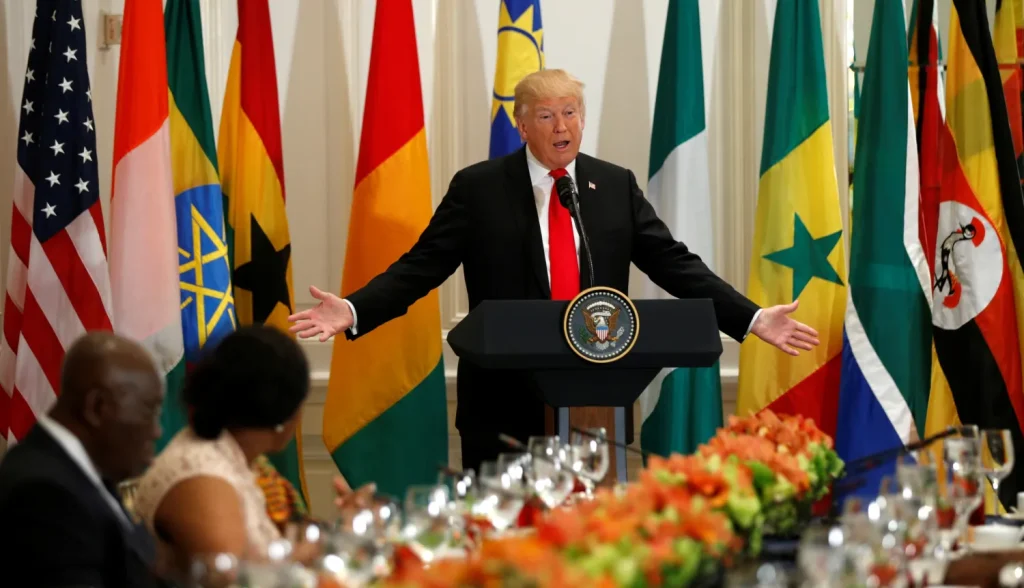
Trump’s Presidency: Rethinking Trade and Development with Africa
As Donald Trump returns to the White House in 2025, Africa braces for the ripple effects of his presidency. Trump’s previous tenure redefined U.S. foreign policy with an unapologetically transactional approach, and there’s every reason to believe this term will continue in a similar vein. For Africa—a continent often treated as a footnote in Washington’s grand strategies—this could mean both challenges and opportunities in trade and development.
AGOA, the African Growth and Opportunity Act, hangs in the balance. Since its inception in 2000, AGOA has been a cornerstone of U.S.-Africa trade, granting sub-Saharan countries duty-free access to the American market for a range of products. In 2022 alone, AGOA-supported exports reached $6.8 billion, bolstering industries from textiles in Lesotho to automotive parts in South Africa. But Trump’s preference for bilateral trade deals over multilateral frameworks could signal a departure from this arrangement. If AGOA is allowed to expire or faces renegotiation, African nations may find themselves scrambling to secure individual agreements, a process that could favor stronger economies while sidelining weaker ones.
The specter of global trade tensions also looms large. Trump’s proposed 10% tariff on all imports threatens to ignite a trade war, with potentially devastating consequences for Africa. Many of the continent’s economies rely heavily on exports of raw materials and agricultural products, often to markets like China and the U.S. A slowdown in global demand triggered by protectionist policies could depress commodity prices, undermine revenues, and exacerbate fiscal challenges for countries already grappling with high debt burdens.
Yet, it would be reductive to see Trump’s policies as purely negative for Africa. His administration’s inclination to prioritize economic partnerships over traditional aid could accelerate private sector-led growth. Initiatives like Prosper Africa, which seeks to double U.S.-Africa trade and investment, align with Trump’s vision of fostering “mutually beneficial” relationships. While this rhetoric is not new, the focus on self-reliance could push African leaders to prioritize domestic capacity-building over dependency on external aid—a necessary, albeit uncomfortable, shift.
Still, the implications for development assistance cannot be ignored. Trump’s previous budget proposals sought deep cuts to foreign aid, and the trend is likely to persist. Programs addressing critical issues like health, education, and infrastructure—areas where Africa needs substantial support—could suffer. For a continent grappling with the aftermath of COVID-19 and increasing climate vulnerabilities, the withdrawal of such assistance would leave a vacuum difficult to fill.
From where I sit, the most pressing question isn’t whether Trump’s policies will help or harm Africa—it’s whether African leaders will seize this moment to chart a new course. Trump’s transactional worldview may not prioritize Africa, but it also presents an opportunity to rethink the continent’s global positioning. Regional blocs like the African Continental Free Trade Area (AfCFTA) could leverage collective bargaining to negotiate better trade terms. Meanwhile, nations must focus on diversifying economies, investing in local industries, and building resilience against external shocks.
Africa’s relationship with the U.S. has long been characterized by asymmetry, with Washington dictating the terms. Trump’s presidency could either reinforce this imbalance or, paradoxically, spur African nations to rewrite the script. As the world’s youngest continent, with an entrepreneurial spirit unmatched anywhere else, Africa has the potential to turn this era of uncertainty into one of transformation. But potential alone won’t suffice—it’s time for action.